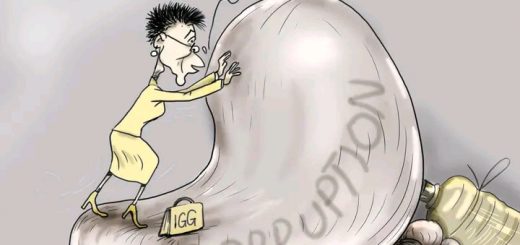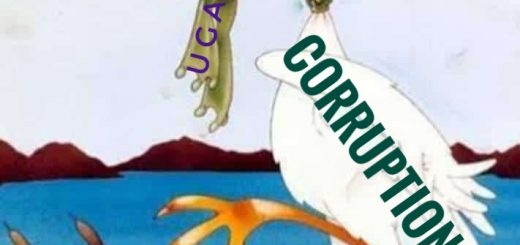Ingredients of Corruption offenses-Abuse of Office and Causing Financial Loss

INGREDIENTS OF THE CORRUPTION OFFENSE IN UGANDA
Criminal Law requires that a person be presumed innocent until proven guilty and that the prosecution bear the burden of proving the guilt of an accused person. The burden never shits though in certain circumstances the accused may have the evidentiary burden to introduce a defence. However, the prosecution retains at all times the burden of proving the guilt of the accused person. The standard of proof has been held to be beyond reasonable doubt. Proof beyond reasonable doubt means that the evidence against the accused person must be so strong that it leaves only a remote possibility of his or her innocence. There are many corruption offense but only the most common are explained here.
ABUSE OF OFFICE
This offence is created under Section 11(1) of the ACA, 2009. It provides that:
“A person who being employed in a public body or a company in which government has shares, does or directs to be done an arbitrary act prejudicial to the interest of his or her employer or of any other person, in abuse of the authority of his or her office, commits an offence and is liable on conviction to a term of imprisonment not exceeding seven (7) years or nine (9) fine not exceeding one hundred and sixty eight currency points or both.”
It was held in Uganda versus Hon. Eng. Abraham Byandala and others, High Court Corruption Division Session Case 12 of 2015 that the prosecution is required to prove the following elements against each accused on a charge of abuse of Office C/S 11(1) of the ACA, 2009:
- Employment in a public body or a company in which the Government has shares;
- (wilfully) Doing or directing an arbitrary act to be done in abuse of his/her authority.
- The arbitrary act must be prejudicial to the interests of his/her employer.
This offense is none controversial in itself and is theoretically easy for the prosecution to prove but some judicial officers seem to misunderstand what amounts to an arbitrary act and the fact that it is a question of law that depends on the circumstances of the case. What is arbitrary includes such misconduct as negligence (breach of duty), unreasonable conduct, illegal conduct, and breach of rules, guidelines, and accepted practices. It was defined in Uganda v Atugonza ACD CR CS 37 of 2010, Uganda v Kazinda ACD CR SC 138 of 2012 as ‘An action, decision or rule not seemingly to be based on reason, system or plan and at times seems unfair or break the law’.
On the other hand willfully was defined in Uganda v HUDSON JACKSON ANDRUA and ANGOL MICHAEL High Court Anti-corruption Division CRIMINAL SESSION CASE NO. 0054 OF 2012 as, ‘deliberately doing something which is wrong knowing it to be wrong or with wreck less indifference as to whether it is wrong or not.’
In addition, it is often mistakenly thought that some sort of loss must be proved in order to succeed on a charge of abuse of office but this cannot be the meaning of ‘prejudicial to the interests of the employer. Prejudicial in its ordinary meaning means harmful to someone or something; detrimental, it means detrimental, damaging, injurious, harmful, disadvantageous, hurtful, inimical, counterproductive; deleterious, unfavorable. On the other hand, according to the House of Lords in Lucena v Craufurd (1806) 2 Bos & Pul MR 269, a man is interested in a thing to whom advantage may arise or prejudice happen from the circumstances which may attend it…and whom it importeth, that its condition as to safety or other quality should continue: interest does not necessarily imply a right to the whole, or a part of a thing, nor necessarily and exclusively that which may be the subject of privation, but the having some relation to, or concern in the subject (matter).
Government interests are numerous but in this context they extend to property interests, interests in good governance, development, rule of law, protection of public resources, national security, good international relations, fairness, and transparency, among others. Any prejudice to legitimate government interests or any act that is detrimental, damaging, harmful, disadvantageous, hurtful, inimical, counterproductive; injurious, deleterious, unfavorable to any of those legitimate government interests is prejudicial to it as an employer and therefore can amount to abuse of office under section 11(2).
Causing Financial Loss
This offence is created under Section 20 of the ACA, 2009. It provides that:
‘Any person employed by the Government, a bank, a credit institution, an insurance company or a public body, who in the performance of his or her duties , does any act knowing or having reason to believe that the act or omission will cause financial loss to the Government, bank, credit institution, insurance company or public body commits an offence and is liable on conviction to a fine not exceeding three hundred and thirty six currency points or a term of imprisonment not exceeding fourteen years or both’.
It was held in Uganda versus Hon. Eng. Abraham Byandala and others, High Court Corruption Division Session Case 12 OF 2015 that the prosecution is required to prove the following elements against each accused on a charge of Causing Financial Loss C/S 20 ACA, 2009:
- That the accused are employees of government or a public body or a company in which government owns shares.
- That in the performance of their duties, the accused did an act or omission knowing or having reason to believe that it will cause financial loss to employer.
- That actual loss occurred.
The mensrea for this offense is knowing or having reason to believe that an act or omission will cause financial loss to employer. The second part of this requirement simply means that the prosecution should present evidence which shows that given the skills, experience of the accused person and the nature of his duties he or she should have known that the act will cause loss. It is possible that there can be reasons to believe that an act or omission will cause financial loss to employer but the accused person does not appreciate that those reasons exist. The accused person has the mensrea provided that he or she appreciated those reasons. It is not necessary to prove that the accused person believed that the act or omission will cause loss. Therefore the accused person does not have to believe that his actions or omission will cause loss. For example a public officer may honestly believe that his employer’s camera has no resale value and throw it away but he would have violated disposal of public assets regulations (an arbitrary act) and thrown away government property without taking steps to ascertain its true value. The mensrea here is provided by the gross negligence or recklessness of the public officer in throwing away the camera without following disposal of pubic assets regulations or taking steps to determine if it had a resale value even though the accused did not appreciate that it was necessary for him to take steps to establish the resale value and follow disposal of pubic assets regulations.
In Uganda Vs Lwamafa Jimmy and 2 Others Anti-Corruption Division Criminal Session Case 9 of 2015 this aspect was expressed as ‘That they did or omitted to do an act they had knowledge would cause Financial Loss’. Since it usually not possible to question the accused person on the facts before him and regarding any knowledge he may have had, it is easier to demonstrate that in the circumstances of the case, the accused person should have known that his act or omission would cause loss. A person intends a result when it purpose to bring it about or where it is virtually certain to result from his or her actions (R v Woolin).
The most problematic aspect of this offense is the requirement of ‘actual loss.’ In the first instance there is nothing in the text of section 20 that says that the loss must be actual loss. The statute merely refers to ‘financial loss”. The definition of ‘actual loss’ provided by the Supreme Court in Kassim Mpanga V Uganda Cr App 30 of 1994 the Supreme Court at page 17 narrows the ambit of the offense of causing financial loss. In this case loss was defined to refer to ‘something that reasonable search cannot recover. Something lost for good and not recoverable’.
Whereas the requirement of a reasonable search or attempt to recover the lost thing is necessary, it is arguable that parliament did not intend that the state should make often expensive attempts to recover resources that its officers have misappropriated due to their negligence or breach of duty. The fact that a loss can be made good at a particular time does not imply that the loss did not occur. If A for example negligently paid B over and above what was owed to B by A’s employer and after a few days A decides to refund the money to his employer, has there been loss. If A at the start of the trial decided to refund the money that he is alleged to have lost, is he guilty of financial loss or if the third-party on the day of conviction decided to refund the money, would there be loss. We consider these and other implications of the definition of loss put forward by the Supreme Court in our next article in the link below
Read More
- Ideal Amendments that should be included in the Magistrates Courts Amendment Bill 2026 of Uganda
- President Yoweri Kaguta Tibihaburwa Museveni is a minority President voted by only 7,946,772 (36.7%) out of 21,649,608 eligible Ugandan voters in the 2026 Presidential Elections
- Four years of IGG Beti Kamya drowned the Inspectorate of Government (IG) deeper into oblivion and irrelevancy but it Can be redeemed
- The Proposal to Make Magistrates Grade Ones Chief Magistrates is an efficient use of resources that will improve service delivery in Uganda
- If Magistrates Courts in Uganda are less competent and more prone to corruption does it mean that the poor deserve inferior justice to the rich.


